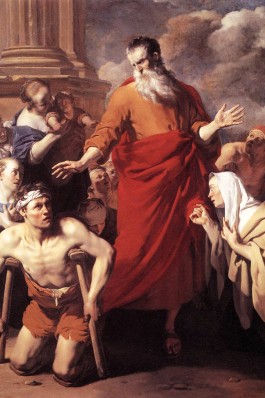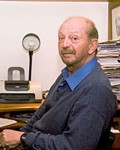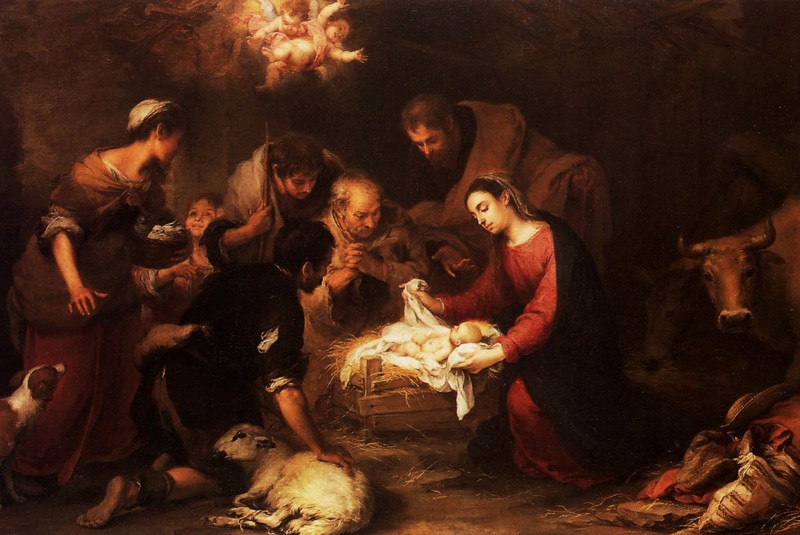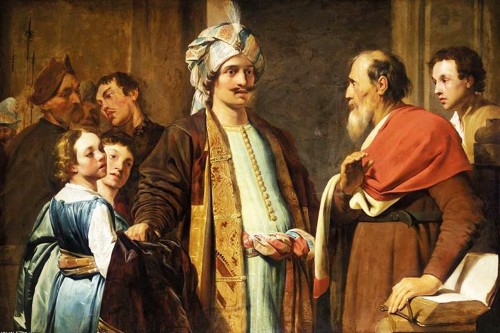The Cures of Jesus

Paul
In Chapter 19, verses 11 and 12, of the Acts of the Apostles of Jesus, the physician evangelist Luke reports: “God did extraordinary miracles through Paul, so that even handkerchiefs and aprons that had touched him were taken to the sick, and their illnesses were cured and the evil spirits left them.”

Moacyr Scliar
Considering this passage, I recall a page from “A face oculta – Inusitadas e reveladoras histórias da Medicina,” written by Brazilian physician and writer Moacyr Scliar (1937-2011), whose title emphasizes “The cures of Jesus.” It is an instructive chapter from a work that completely captures the attention of those who read it. Below are some excerpts from it:
“During his time on Earth, the figure of Jesus changes: first we have the baby who is born in a manger, then the child who astonishes the wise men in the temple, then the preacher who enraptures the multitudes, and the irate leader who expels the traders and money changers. And there is also–very importantly–the Jesus who cures: ‘And behold, a leper came to him and knelt before him saying: Lord, if you will, you can make me clean. And Jesus stretched out his hand and touched him saying: I will; be clean. And immediately his leprosy was cleansed.’ (Matthew 8:1). This cure is followed by many others: of the lame, crippled, blind. The pinnacle of this sequence is the resurrection of Lazarus, in which death itself is defeated. At a time when medicine was practically non-existent, the cures of Jesus enthralled the multitudes.


Elijah
“Because in this, as in other things, Jesus was a revolutionary. The Old Testament talks a lot about the body and its diseases, but it dwells above all on sanitary measures. Returning to the previous example, leprosy is the object of very detailed prescriptions in Leviticus. Anyone suspected of having the disease must be taken to a priest, who, by way of previously established criteria, will diagnose it and declare a state of ‘impurity’, which translates into the strict isolation of the sick person. Disease, particularly epidemic diseases, is seen as divine punishment, and it is no wonder that the Lord resorts to the plagues to intimidate the Pharaoh. On the other hand, there are many rules for keeping healthy: rules about bodily cleanliness, dietary rules, and rules about how to dress. There are no cures, let alone magic ones. The exception is the episode in which Prophet Elijah revives a child; curiously enough Elijah, who was taken up to Heaven in a chariot of fire, is considered a forerunner of Jesus.”

Elisha
Elisha, a disciple of Elijah, healed General Naaman who was a leper. The prophet ordered him to bathe in the river and he was cured.
And Dr. Scliar continues:
“In short: the Old Testament is the domain of public health; the New Testament introduces individual curative medicine.
“Christianity inherited from Jesus the task of looking after the sick. Hospitals were, characteristically, Christian institutions and during the Middle Ages monks were the depositaries of medicine. They served an immense social need, as is shown in Brazil by the Santas Casas.”
Congratulations to the late and illustrious Dr. Moacyr Scliar. He focused on a very important subject and in a very special way. This enlightened vision of the Old and New Testaments lends itself to various studies.
Spiritual Health

Ana Serra
Also with regard to physical and spiritual health, in an interview I gave to the Portuguese journalist Ana Serra on September 19, 2008, she asked me the following question:
“In your book ‘Reflexões da Alma’ [Reflections of the Soul] you provide evidence of the link between the Spirit and the body, saying that the tranquility of the soul can heal the body. In what way? Is this peace of spirit accessible to everyone?”

Reflections of the Soul
My dear colleague, everything originates with the Spirit. The body is our provisional garment. Today, the World Health Organization (WHO) is already working with the importance of spiritual health. There are a lot of serious researches that indicate how Spirituality influences the well-being of an individual. In such a needy world, the competent tool to be used to achieve the tranquility of the Soul is prayer, accompanied by the effective action of Solidarity (which should always guide the work of governments). Without this, praying, which is born out of harmony with God (or for those who have no religious belief, the experience of the highest feelings), could, in certain cases, only be transformed into yet another execrable embodiment of selfishness. To better understand spiritual and socially active Faith, I coined the expression Accomplishing Faith: that which unites us to the Superior Powers, pacifies our Souls and motivates us to strive for the Good of society. Accomplishing Faith is, therefore, what drives the pioneers of progress in the world and prevents communities from stagnating. Its duty is to create and act in an environment without intolerance, which over the centuries has been one of the biggest afflictions of Humanity. . . .
How to Cure the Body
Thus, let us move in the opposite direction of the path that leads man to diseases. Let us live linked to the Heavenly Father. Let us not fall into the traps that make our organism sicken. Then it will become evident, even to the most skeptical of men or women, that respect for spiritual things is a strong element for every cure. As I once wrote, medicines are more efficient where Love reigns.
The comments do not represent the views of this site and are the sole responsibility of their authors. It denied the inclusion of inappropriate materials that violate the moral, good customs, and/or the rights of others. Learn more at Frequently asked questions.